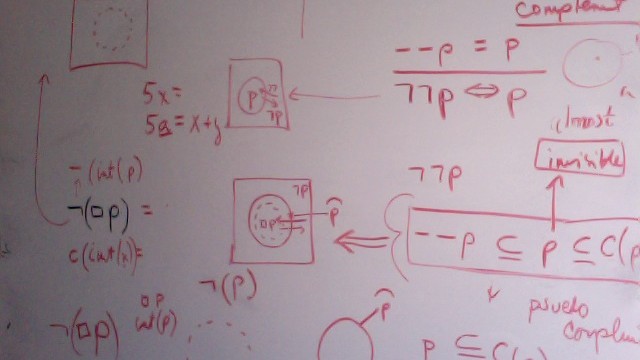The summary below is the introduction to a Jan. 2013 course that took place at the Public School in Los Angeles.
Psychoanalysis Los Angeles California Extension
A history of psychoanalysis shows Freud inventing a theory in concordance with his clinical observations; yet, in so doing he is forced to critique his own analytic theory, in the manner of K. Popper, and to reexamine its foundations and claims to a cure.
Today, the analytic cure has been so overlain with therapy, psychology, and popular jargon that it is difficult to account for the successive critical moments of Freud's theory and the analytic cure. Moreover, it is difficult to determine exactly where Freud actually leaves off and where the next generation of post-Freudians begin and to what extent they can claim to have gone beyond the initial problems with theory and cure.
psychoanalysis psychoanalysis
Our intervention aims to return to Freud to examine the decisive auto-critical moments of psychoanalysis, then show how Lacan's return to Freud not only generalizes Freud's successive auto-critiques, but re-opens the analytic cure.
Lacan signaled that contemporary analysis must begin with
"the reintroduction of the Name of the Father into the discourse of Science" [Science & Truth] Our intervention will begin by examining how such a seemingly incongruous statement is crucial to an explanation of the analytic cure. It will be important, for instance, to show how Lacan, before Deleuze and Guatarri, was the first to introduce an
Anti-Oedipus in showing how the paternal function was not a third in a ternary triangle between mother and child, but a fourth that disrupts and reorients the ternary structure. Such an
Anti-Oedipus is nothing other than an
Anti-therapeutic reading of psychoanalysis.
We only leave here an introductory outline, but will provide references for the argument in the seminar.
Lacan claimed that not only did Freud not create a theory capable of a cure for psychosis – the traditional post-freudian line – but that Freud did not have a cure for neurosis either. In fact, every time Freud began to work with neurotics in the clinic, the analysis broke down or squandered into an interminable therapeutic transfer, positive or negative, with an analyst considered as an ideal: an expert, an ideal father, a scientist, a protector who would "create a safe place to discuss anxiety". (this is the default line of consumerist therapy).
psychoanalysis psychoanalysis psychoanalysis psychoanalysis
Our previous intervention in
Anti-Therapy I, concluded by showing how the relay of the Master/Slave dialectic sets up the achievement, at least for Hegel, of the Bourgeois individual who dreams of being satisfied with a position in the family and society. This is the 'as if' of Kant's infamous
Cosmopolitain. In analytic terms, if such an achievement were possible, it would provide a solution to the
Oedipus Complex.
Lacan makes a double critique:
1) that the Master/Slave dialectic is never completely synthesized by the Bourgeois State or Individual; what insists, however, is Hegel's
Unhappy Conscious and the
Beautiful Soul – what Freud would reformulate into the terms of Neurosis. To be brief: what the achievement of modern society requires, at least for Lacan, is not the Bourgeois individual or a
Cosmopolitain, but a Neurotic.
2) that our society has passed from a Feudal to Capitalist-Consumerist Society in which the Paternal Function has been rejected, while it is the experts of the state and private enterprise – the judge, the educator, the therapist, family services, etc. – who have taken its place.
In short, what modern society offers as a therapeutic cure for its own conditions of neurosis (1), are forms of psychosis (2): a rejection of the paternal function and its replacement by stand-in third: the benevolent or malevolent father now normed as the Educator, Expert, Therapist, Judge, or Scientist of Society. Beyond the philosophical and sociological terminology, such a framework proposes a solution to the Oedipus in its rejection.
The Lacanian cure is a-psychotic in the sense that its formulation of the Oedipus is 'anti-' not in the sense of a psychotic rejection, but an '
in spite of'.
Analysis makes the case that if in the name of scientific progress, in the decline of religion and the loosening of family ties, the paternal function is no longer idealized, this does not exhaust the necessity of its real function in promoting the development of the individual and society. Most notably, the paternal function permits the child a place of detachment from the Thing – or the incestuous desire of the Mother.
It is a thesis of Lacanian analysis that, in the absence of the father, the paternal function is today replaced and reinvented in a way that produces the post-modern symptoms of which we have become all too familiar: pedophilia, sexual abuse, rape, school shootings (the majority of the recent public and school shooters were without fathers), anorexia, and drug addiction. In each case, it is not a parent who is called into place to help resolve the problem, but a collective of experts – the judge, the psychologist, educator, and family services – who are called upon to decide it, while serving to stigmatize the father, or parents in general, for not living up to their ideals. It is as if the paternal function is still both loved and feared, but can only be identified with today negatively: through rites of public rejection and humiliation.
Our intervention aims to introduce and isolate the real of the paternal function beyond the current day masquerades and by so doing open up a place for the analytic cure.
Though neither attendance in
Anti-Therapy I nor a previous analytic reading is required, it would probably be helpful to have read the reading assignments of Kant and Hegel in the
Anti-Therapy I seminar of 2012.
Seminarist; R.T. Groome
Psychoanalysis Los Angeles California Extension


Comments are closed, but trackbacks and pingbacks are open.